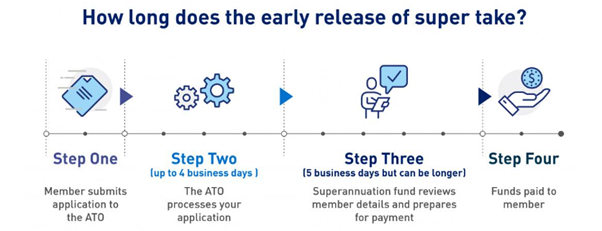Summary
- Super funds have paid $12.2 billion to members in financial distress. The disbursement has been swift and are being paid in less than 5 days.
- 10 super funds have paid $8.13 billion to members, out of the total.
- Investment management businesses may provide with income shelter. Dividend has been hard to come by for income seeking investors as businesses now focus on maintaining liquidity.
- Magellan’s Airlie Australian Share Fund has outperformed the Australian market by 6.6% over the year to 31 May (net of fees).
Super funds are in the midst of heavy outflows as Australians are accessing early super scheme. Federal Government introduced the scheme in the March this year, for the ones who were facing financial hardships due to COVID-19.
It is indeed commendable as super funds have been making payments to members efficiently. As per the Australian Prudential Regulation Authority, the majority of the payments are being paid within five days.
According to the latest data as of 24 May 2020, super funds have paid a total of $12.2 billion since inception of the scheme. And, members have received an average payment of $7.47k while average time spent on releasing payment was 3.3 days.

Source: APRA
Super funds had received 1.78 million of which 1.63 million are paid. The fund level data suggests that 149 funds out of the 177 funds made early payments since inception of the scheme. Majority of the payments were undertaken by 10 funds that have paid $8.13 billion and made 1.09 million payments.
Sustainability of super funds
In March, the COVID-19 led sell-offs in the markets has caused damage to the funds under management of asset managers, largely due to market movements. However, markets have recovered since the March lows, which means positive market movement and relatively better funds under management.
When the Federal Government announced early access scheme, super funds were not comfortable with policy action. People running super funds noted that large scale payments to members could hurt their operational capability or liquidity.
Street was skeptical on super funds because super funds have been investing in illiquid assets like unlisted equities, property, alternative assets etc. Such asset classes are hard to cash out instantly – and amid a crisis like we are in today – could lower the fair value of these asset classes, thus possibilities of loss on sale are higher.
On the other side, the market-traded asset classes had suffered one of the heaviest dislocations in history, causing markets to fall rapidly and extremely – breaking many records in the process. And, selling out of holdings, for early access payments, at record lows will likely have adverse effects on the performance of the funds.
Moreover, when uncertainties are at a higher level causing large scale sell-offs in the markets – large institutional investors like super funds should not become forced sellers – just because optimal asset allocation and risk management were missing at the top.
Policymakers also noted that regulators have the ability to undertake force majeure mergers of the super funds. It also raised questions on the sustainability of super funds and asset allocation decisions of the investment managers that are managing members’ money for their retirement.
Last year, super funds industry had been on the radar of prudential regulator since APRA Heatmap was published, revealing a host of MySuper products charging good money, but returning poorly. Moreover, it revealed super funds were charging higher fees albeit delivering lacklustre returns.
Investment management business may pay you dividends
Most of Corporate Australia is embracing dividends cuts or deferrals, cost control, capital expenditure deferrals etc. All this is being undertaken to preserve cash and ride out of the storm caused by COVID-19.
Fair enough, preserving cash to sustain the crisis should be priority of any business. But many income savvy investors now have to find other sources of dividends as many sources have now restricted the payments.
Revenue stream of investment management business depends on fees, which are further classified into management and performance fees generally. Performance fee component of the business depends on the underlying performance of the funds and its conditions to avail the fee.
However, the management fee part is not dependent on performance of the fund, and investment management businesses earn management fee based on the proportion (fee rate) of the assets held by the fund.
Sometimes investment management business also offer services to diversify their revenues, which seems a promising indicator of a sustainable business model. Although investment management is a cyclical industry, one could find opportunities to look for income stocks.
Investors should not expect the same level of dividends that were paid by the businesses over the past as operating scenarios have changed since COVID-19. Now the operating environment also has uncertainties, and the bull market has ended.
Earlier last month, Pendal Group Limited (ASX:PDL) reported half year results for the period ended 31 March 2020. It declared an interim dividend of 15 cents per share, lower than prior periods. PDL reported statutory profit of $54.8 million against $69.6 million in the previous corresponding period.
PDL notes that COVID-19 pandemic has impacted client sentiment, economies, fund flows and markets this calendar year. Performance fee revenues were impacted severely.
On 5 June 2020, PDL last traded at $ 6.400, down by 1.5% from the previous close.
Magellan Financial Group Limited (ASX:MFG)
Recently, Magellan has launched an active ETF – Airlie Australian Share Fund, being the fourth active ETF launched by the company. The new fund is trading under the ticker AASF and has outperformed the Australian market by 6.6% over the year to 31 May (net of fees).
At the end of May, the company had $98.45 billion in funds under management, up from $97 billion in the previous month. During the month, it experienced net outflows of $288 million, of which institutional investors pulled $ 516 million while $228 million came in through retail investors.
On 5 June 2020, MFG last traded at $ 58, down by 1% from the previous close.
Super funds are facing outflows due to early access scheme, but most of the outflows are limited to ten funds. Investment businesses have annuity style revenues to a large extent, which may provide income to shareholders.



